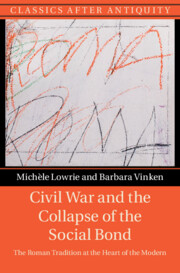Book contents
- Civil War and the Collapse of the Social Bond
- Classics after Antiquity
- Civil War and the Collapse of the Social Bond
- Copyright page
- Dedication
- Dedication
- Contents
- Figures
- Preface
- Acknowledgments
- Introduction
- Chapter 1 Figures of Discord
- Chapter 2 Oriental Empire
- Chapter 3 Empire without End
- Chapter 4 The Eternal City
- Chapter 5 The Republic to Come
- Chapter 6 The Empire to Come
- Bibliography
- Index
Chapter 3 - Empire without End
Vergil, Aeneid, and Lucan, De bello civili
Published online by Cambridge University Press: 06 October 2022
- Civil War and the Collapse of the Social Bond
- Classics after Antiquity
- Civil War and the Collapse of the Social Bond
- Copyright page
- Dedication
- Dedication
- Contents
- Figures
- Preface
- Acknowledgments
- Introduction
- Chapter 1 Figures of Discord
- Chapter 2 Oriental Empire
- Chapter 3 Empire without End
- Chapter 4 The Eternal City
- Chapter 5 The Republic to Come
- Chapter 6 The Empire to Come
- Bibliography
- Index
Summary
De bello civili may be an anti-Aeneid, but the contrast depends on a deeper accord. Both poems look back: to the mythic backstory of Rome’s foundation and to the history of the Republic’s fall. Both comment on the present. The inscription of civil war tropes into Rome’s foundation asks whether internal violence is endemic, or if the Augustan refoundation can put Rome on a more secure footing. The Republic’s death at the hands of Pompey and Caesar founds the Empire on perennial discord. The civil war tropes undergirding Vergil’s integrative story become the literal plot of Lucan’s. Foundation and defoundation share tropes: fratricide and rape. In Vergil, these tell an alternative story to the golden age the poem proclaims. In Lucan, the Augustan settlement disappears. As in the Aeneid, discord subtly defines the present: The panegyric to Nero defers peace to an uncertain future as effectively as the Aeneid’s defers the Augustan peace. Alternative cities – Troy, Carthage – reveal Rome’s perverse nature in Vergil. Caesar, embroiled with Cleopatra, founds an oriental empire in Lucan. Turmoil within the soul, between lovers, within peoples, and in the cosmos belies both poems’ promise.
- Type
- Chapter
- Information
- Civil War and the Collapse of the Social BondThe Roman Tradition at the Heart of the Modern, pp. 82 - 143Publisher: Cambridge University PressPrint publication year: 2022
- 1
- Cited by

